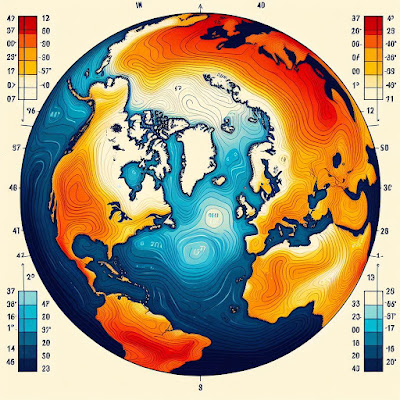The year 2023 ended with the dubious distinction of being the hottest on record. But the heatwave didn't stop there. January 2024 saw a continuation of the trend, with record-breaking temperatures scorching regions across the globe. From Spain to Siberia, the mercury climbed to unprecedented levels, raising concerns about the accelerating pace of climate change.
The Heat is On:
- Spain: In early January, parts of Spain witnessed temperatures exceeding 30°C, shattering January records and leaving ski resorts bare.
- Siberia: Even further north, Siberia experienced temperatures 10°C above average, contributing to rapid snowmelt and raising fears of spring floods.
- Australia: Australia's east coast saw its hottest January on record, with heatwaves impacting agricultural yields and exacerbating bushfire risk.
Beyond the Headlines:
These isolated events paint a concerning picture when viewed through the broader lens of climate science. Research by the World Meteorological Organization (WMO) suggests a one-in-three chance of 2024 surpassing 2023's record-breaking temperatures. This potential scenario is fueled by several factors:
- Long-term warming: The planet has been warming steadily for decades due to greenhouse gas emissions. This trend raises the baseline temperature, making extreme heat events more likely.
- El Niño: The current El Niño, a cyclical warming of the Pacific Ocean, is expected to peak in the coming months, further amplifying global temperatures.
- Natural variability: While natural weather patterns can contribute to short-term fluctuations, the underlying trend of rising temperatures remains undeniable.
Some of the factors that contribute to these high temperatures include:
- The Arctic amplification, which is the phenomenon of faster warming in the polar regions than the rest of the globe
- The weakening of the polar vortex, which is a large-scale circulation of cold air that normally keeps the Arctic cold
- The loss of sea ice and snow cover, which reduces the albedo effect and exposes more dark surfaces that absorb heat
- The increased frequency and intensity of atmospheric blocking events, which are persistent high-pressure systems that disrupt the normal flow of weather patterns
Looking Ahead:
The record-breaking heat of January 2024 serves as a stark reminder of the urgency of addressing climate change. The IPCC's Sixth Assessment Report warns of increasingly severe heatwaves, droughts, and floods if we fail to act.
What can we do?
- Individual action: Reducing our carbon footprint through sustainable practices like energy efficiency and responsible consumption can make a difference.
- Policy change: Supporting policies that promote renewable energy, carbon pricing, and climate adaptation measures is crucial.
- Raising awareness: Educating ourselves and others about the science of climate change and its potential consequences is essential for driving collective action.
The scorching start to 2024 is a wake-up call. We must act now to mitigate climate change and build resilience to its impacts. By taking individual and collective action, we can turn the tide and safeguard a habitable planet for future generations.
Sources:
- World Meteorological Organization: https://wmo.int/
- Copernicus Climate Change Service: https://climate.copernicus.eu/
- Intergovernmental Panel on Climate Change: https://www.ipcc.ch/
- Time Magazine: https://time.com/6554830/2023-hottest-year-ever/
- Euronews: https://www.euronews.com/green/2024/01/26/january-temperatures-soar-to-nearly-30c-in-spain-as-start-of-the-year-brings-record-heat
Disclaimer: I am not a climate scientist, and this blog post is not intended to be a comprehensive analysis of the complex issue of climate change. However, I hope it provides a starting point for further exploration and discussion.

